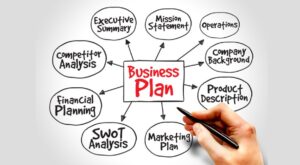How to Use a Business Plan Example to Help Write Your Business Plan?

Writing a business plan from scratch is not simple. Using a business plan template makes things a bit easier, providing structure and guidance for what to include in each section.
Even with this support, it can still be difficult to know how to talk about your business—especially if there are things you believe are necessary but not in the template. Which is when reviewing an actual business plan example can be a lifesaver.
What is a Business Plan Example?
Business plan examples are sample documents showcasing complete or partial sections of a real-world business plan. Unlike a business plan template, examples of a business plan include fully written sections for specific business models, operations, and industries.

These examples may not always follow the exact structure found in most “how-to” guides or business plan templates. Instead, each sample business plan showcases how different business owners adjusted their business plans to fit their needs and the nuances of their market.
How to Use a Business Plan Example Effectively?
Understanding the Structure and Format
Use the business plan example to understand what sections of a business plan are used by other business owners in your specific industry. You’ll commonly see an executive summary, market analysis, organizational structure, product/services, marketing strategies, and financial projections.
Inspiration for Your Own Business Plan
You may also see specific market research data, unique selling propositions, or operational plans relevant to your business. Pay attention to how this information is organized and presented to make your plan clear, professional, and easy to follow. Use the example as a foundation, but customize the details to reflect your unique business model, goals, and strategies.
Benchmarking and Best Practices

Compare your business’s goals and projections against those in the example to improve your chances of setting realistic and achievable targets. Additionally, try to learn from the business plan example and identify any strengths or weaknesses. This can give you ideas for what must absolutely be included and what should be avoided in your own plan.
Financial Planning
Use the example to understand how to create detailed financial projections, including profit and loss statements, cash flow analysis, and balance sheets. Pay close attention to what specific items are in their budgets to inform what expenses you will likely incur, as well as any more issues around profitability or cash flow. These can be red flags for you to be aware of and ideally avoid in your business.
Refinement and Review
Reviewing a business plan example after you’ve written your own plan can be equally as useful. Rather than using it to inform your writing, you can use it to spot-check and edit your work. Whether that’s adjusting your tone or adding more details it can be a great spot-checking tool to verify if your plan is actually complete.
Common Mistakes When Using a Business Plan Example
1. Looking for an Example of a Business Plan That’s an Exact Match
Let’s say you’re opening a Pakistani restaurant. You’d probably have to look long and hard to find a sample Pakistani restaurant business plan. But if you’re exploring the over 550 business plan examples to find an exact match—you’ll find there are more than three dozen restaurant sample plans.
Many of them may be relevant, and it really doesn’t matter if it’s an exact match in this case. An Italian restaurant plan will still show you the layout and structure of the document. Even specific things, like whether the tables and chairs you buy will be assets or expenses, will translate from one type of restaurant to another.

Look for a sample plan that’s a relatively close match, but don’t get hung up on the details. Because you’re the expert on your own business, the research you do to understand your target market, your competition, and your particular business model will help you fill in the details and really make your business plan useful and credible to potential funders.
2. Assuming the Sample Business Plan is Perfect
Just because most business plan examples are either based on real-world businesses or crafted by professional writers doesn’t mean they’re all perfect. If you are looking at a business plan and a piece of it doesn’t fit your business model or just doesn’t sound right to you, don’t be afraid to discard it.
Too often, people think a sample plan is a model when, in reality, it’s just an example of what one person did. One size doesn’t fit all, so don’t try to cram your business idea into a sample plan just because it seems like it’s close.
3. Just Copying the Business Plan Example
A sample business plan isn’t going to work as a pre-written plan for your business that you can copy and paste. You can’t just swap out your business name and call it a day, even if everything about your two businesses appears identical.
Some of your business plan elements will invariably be different, so you’ll want to ask the following questions:
- When was the plan written?
- What’s the market like in the business location compared to where you’re starting your business?
- How many employees do they have, and how much are they getting paid?
For example, in an example when starting a pet boarding business, the example lists full-time employees who will be making $1,280 a month, which would be $8 an hour. That might have been fine in 2001, but if you were opening a kennel in the state of Oregon today, you’d get in big trouble with those numbers since you’d be planning to pay your staff more than $5 below the state’s current minimum wage. So be sure to edit thoroughly!
4. Misunderstanding the Purpose of Your Business Plan
Your business plan should suit your business purpose. You don’t need a full formal business plan if you don’t have to show a plan to outsiders for some business purpose, such as a business loan or an investment.

A simpler one-page business plan is way easier to develop and, for most business owners, will actually serve you better.
If you aren’t writing a plan for outsiders, then you probably don’t need descriptions of the product, team, or exit strategy. Just cover the key points—strategy, tactics, milestones, and essential numbers—with simple bullet point lists and tables.
Use Business Plan Examples Carefully
Every business, whether it’s launching next week or has been around for 50 years, can benefit from business planning. It’s scientifically proven.
This means that to get the real value from writing a business plan, you need to actually do the writing. Don’t copy an example exactly; instead, use it to inspire and inform your own business plan. You’ll end up knowing your business better and walk away with a more useful business plan.
